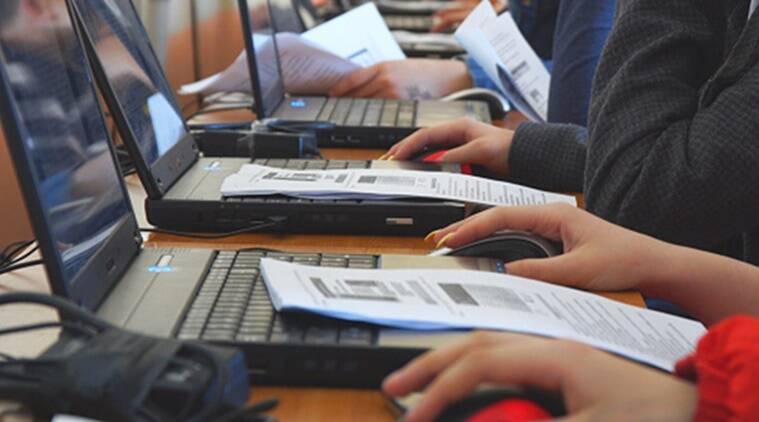Online education is believed to be cost-effective and more inclusive in nature. The availability of Internet connection from Kashmir to Kanyakumari (thanks to the onset of the Bharatnet project by the Modi Government) has made giant progress in education sector reforms in the country. The books which were only available in libraries of esteemed institutions like IITs, IIMs, DU etc are now accessible to a normal student sitting in his village with an internet connection. As the Chinese origin Covid-19 induced lockdown started, the internet turned out to be a boon. 50-year-old teachers attended back-breaking workshops to teach online. Universities have now conducted multiple exams in an online mode.
Time to assess the effectiveness of online education
Online classes and exams seem to be quite fancy and decent to start with, but it is now costing students their future. Coveted for their better results, online classes have now started to bleed poor results. In an unexpected turn of events, 40 per cent of first-year students of MBBS courses in Bihar could not clear their final examinations. Out of the total of 1,172 students, 447 failed. All these examinations and classes for them were conducted in an online mode. The student wing of the Indian Medical Association cited the impact of the Covid-19 pandemic on students for the poor result.
Online examinations
According to advocates of online examinations, traditional closed-book and time-restricted examinations in an invigilated environment are most commonly reported to negatively impact student well-being. But looking at things from a practical angle, these offline examinations help in cultivating a disciplined approach in life. Just sheer rewiring a mind goes through while focusing on a certain theme for 180 minutes cannot be ignored. Those 3 hours gives the brain a certain direction and creates an aura of an “ordered environment” in the brain. Online examinations on the other hand have been killing the intra-student competition. Though the competition for marks is heavily criticized in liberal culture, its presence gives students something to target. In online exams, students have been found to share flats for assisting each other. Sometimes, Students tend to form online groups to help each other, they distribute questions among themselves and each student solves his part and then forward the answer to others. It’s like you are being awarded not for winning something, but just for participating. The final aim is to get marks, they somehow get it, but when it comes to real-world scenarios, they are often found dumbstruck.
Online Classes
Online learning has also created an aura of discontent and mental health problems in students. Research indicates that, where the perceived demands of an evaluated task exceed one’s practical and mental resources, cognitive overload ensues, with detrimental impacts on both well-being and performance. The socialization of the kids is getting affected. Schools and colleges are not just for bookish knowledge, they also provide an environment where students learn to interact with one another, know about different types of environments, debate, hold discussions, challenge their ideas, and develop their mental capacity. Online classes affect students on all these fronts. In today’s corporate environment, sheer knowledge is not enough, its presentation and concise understanding are more important. In a report, the Indian Association for preventive and social medicine(IAPSM) argued for the opening of schools. It said- “Children learn most when with other children in schools, which contributes to their social, emotional and mental well-being and impart skills such as communication and negotiation, to list a few.”
Children are at negligible risk for Covid-19
In its report, IAPSM cited several data and reports to support the opening of schools. According to the document, the available medical evidence indicates that children are infected with Covid-19 at a similar rate to adults. “However, a large proportion of children remain asymptomatic/mild symptomatic. SARS-CoV-2 infected children seldom need intensive care as compared to adults,” the document read. Citing the fourth national serosurvey, the report added that children have already been affected at a higher level than adults, and herd immunity must have kicked in. IAPSM also quoted various studies, including one by researchers from the US, to highlight that children are less frequently symptomatic.
Problems for India
It has already been an established fact that our education system does not prepare students for the job market. According to a study, a historical focus on rote learning – or memorising facts to be regurgitated – is still prevalent in much of India’s education system and can lead to graduates attaining good grades but failing to pick up the skills needed for innovation or out-of-the-box thinking that is so vital in today’s modern workplace.
Moreover, women are getting severely hit by these online classes and examinations. The poor families still prefer handling the phone to the boy child, the girl child is left stranded for her classes, in turn throwing her out of the workforce. This is creating more dent in already declining women’s participation in the workforce.
It’s high time, India should start opening schools and colleges. We have already faced massive waves of Covid-19 and it’s almost foolish to assume that Covid-19 has spared anyone. Most of us were asymptomatic and did not even realise it. Modi Government should recall the concept of ‘Herd Immunity’ and open up our institutions. Only an intelligent workforce will be able to beat China by 2030.
